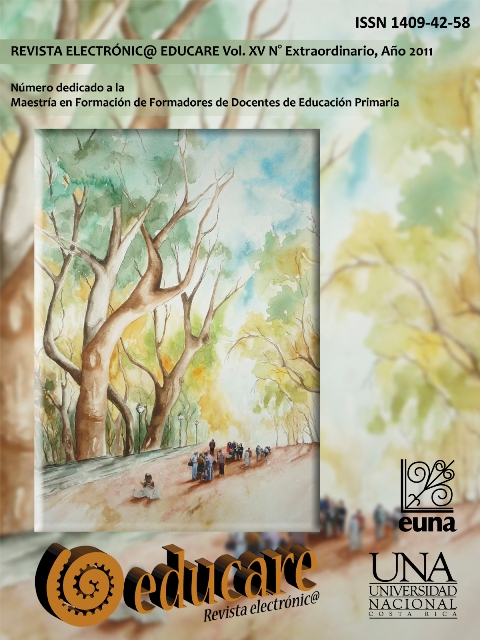Maleku: A Culture in Danger of Extinction
DOI:
https://doi.org/10.15359/ree.15-Ext.5Keywords:
Intercultural education, world-view, oral expression, MalekuAbstract
This paper is about the Maleku, one of the indigenous languages that is still alive in the country; though the linguistic community that uses it, composed of less than 400 people, tends to reduce rapidly. There is a high risk that in the near future this language will disappear. This paper is the result of a research project that proposes the construction and implementation of learning strategies that would help to include the customs, traditions and the native language of the Malekus in the schools, to strengthen the identity and culture of this Costa Rican indigenous population.
The research project includes a brief overview of the history and problems of the indigenous Maleku population, and an analysis on the importance of the language and oral expression. It also makes a review of how the indigenous languages in Costa Rican schools are currently taught. It later includes a diagnosis of the current situation of language from the perspective of different members of the Maleku community. This diagnosis is based on the research conducted and it will facilitate focusing on the integration of the Maleku and rural curriculums. Finally, there are some reflections about the bilingual intercultural education.
References
Arguedas, U. (1972). Algunas notas acerca de los guatusos. [Material sobre los guatusos
mimeografiado]. San José, Costa Rica: Departamento de Ciencias del Hombre: Universidad
de Costa Rica.
Asamblea Legislativa. República de Costa Rica. (1977). Ley indígena N° 6172 (Artículo 3). San
José: Costa Rica. Autor. Recuperado de http://www.iidh.ed.cr/comunidades/diversidades/docs/
div_infinteresante/ley%20indigena%20costa%20rica1977.htm
Bolaños, M. (noviembre, 2002). Ruralidad y multiculturalidad en la Centroamérica contemporánea.
III Seminario Latinoamericano de Educación Rural: Encuentro de Experiencias. Congreso
llevado a cabo en la Universidad Nacional. Heredia, Costa Rica.
Castillo, R. (2005). El territorio histórico maleku de Costa Rica. Reflexiones, 84(1), 71-85.
Catrileo, M. (noviembre, 1995). La determinación en mapudungun. XI Seminario Nacional de
Investigación y Enseñanza de la Lingüística. Congreso llevado a cabo en la Universidad Bio
Bio. Chillán, Chile.
Castro, E., Blanco, A. y Constenla, A. (1993). Laca majifijica. La transformación de la tierra (Trad.
y Ed. A. Constenla). San José, Costa Rica: EUCR.
Chacón, R. (1988). La tutela de los derechos indígenas en Costa Rica. Enunciación de los decretos
ejecutivos que los regulan. San José, Costa Rica: Imprenta Nacional.
Guevara, M. y Chacón, R. (1992). Territorios indios en Costa Rica: Orígenes, situación actual y
perspectivas. San José, Costa Rica: García Hermanos.
Organización Panamericana de la Salud [OPS]. (2003) Desarrollo y salud de los pueblos indígenas
de Costa Rica. San José, Costa Rica: Organización Panamericana de Salud y Ministerio de
Salud.
Ovares, S. y Rojas, C. (2008). La enseñanza de las lenguas indígenas en Costa Rica. Letras, 43,
-21.
Peralta, M. V. (2008). En la educación nos jugamos el futuro: ¿Qué cultura estamos legitimando en
nuestras aulas? Revista centroamericana de educación, 3(1), 127-142.
Restrepo, G. (1994, septiembre). Narración, escritura e imaginarios. Nómadas, 1, 1-12. Recuperado
de http://redalyc.uaemex.mx/redalyc/pdf/1051/105115239006.pdf
Rockwell, E. (1998). La dinámica cultural en la escuela (Cap. 1). En A. Álvares (ed.). Hacia un curriculum cultural. La vigencia de Vygotski en la educación (pp. 21-38). Madrid, España:
Fundación Infancia y Aprendizaje.
Rodríguez, J. M. (2002, junio). Patrones y principios en la moralización de las acciones. Una
investigación en la cultura bribri. Revista de Ciencias sociales, 2(96), 23-24.
Downloads
Published
How to Cite
Issue
Section
License
1. In case the submitted paper is accepted for publication, the author(s) FREELY, COSTLESS, EXCLUSIVELY AND FOR AN INDEFINITE TERM transfer copyrights and patrimonial rights to Universidad Nacional (UNA, Costa Rica). For more details check the Originality Statement and Copyright Transfer Agreement
2. REUTILIZATION RIGHTS: UNA authorizes authors to use, for any purpose (among them selfarchiving or autoarchiving) and to publish in the Internet in any electronic site, the paper´'s final version, both approved and published (post print), as long as it is done with a non commercial purpose, does not generate derivates without previous consentment and recognizes both publisher's name and authorship.
3. The submission and possible publication of the paper in the Educare Electronic Journal is ruled by the Journal’s editorial policies, the institutional rules of Universidad Nacional and the laws of the Republic of Costa Rica. Additionally, any possible difference of opinion or future dispute shall be settled in accordance with the mechanisms of Alternative Dispute Resolution and the Costa Rican Jurisdiction.
4. In all cases, it is understood that the opinions issued are those of the authors and do not necessarily reflect the position and opinion of Educare, CIDE or Universidad Nacional, Costa Rica. It is also understood that, in the exercise of academic freedom, the authors have carried out a rogorous scientific-academic process of research, reflection and argumentation thar lays within the thematic scope of interest of the Journal.
5. The papers published by Educare Electronic Journal use a Creative Commons License:














 The articles published by Educare Electronic Journal can be shared with a Creative Commons License:
The articles published by Educare Electronic Journal can be shared with a Creative Commons License: 



